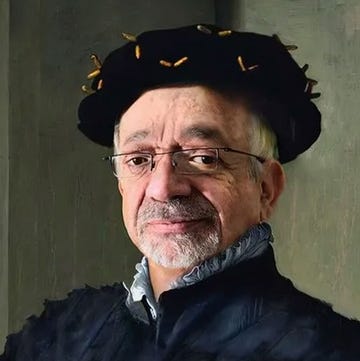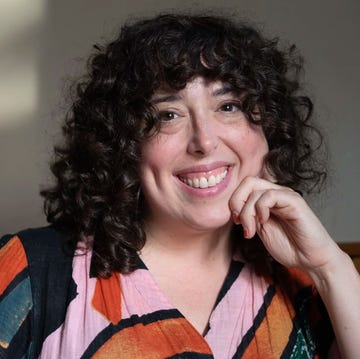COVID-19 reconfigured a lot for a lot of people, in ways that we have not yet begun to understand. There was the sometimes unbearable loneliness of it, the awakenings it spurred, a kind of pull toward stillness. This is the situation in which the unnamed narrator of Marie Mutsuki Mockett’s psychological novel The Tree Doctor finds herself, after returning to Carmel from Hong Kong without her husband and children at the onset of the pandemic. Carmel is where the character grew up, and she has returned to put her mother, who is suffering from dementia, into a nursing home.
The Tree Doctor unfolds as a chronicle of wanting and growth against a grim backdrop we can’t help but recognize. Once the world goes into lockdown and the deaths stack up, Mockett’s protagonist can’t return to her family, but then again, she doesn’t want to; she is on an inner quest of sorts to feel more alive, even as she attempts to care for her fading mother, who initially she cannot even visit face-to-face.
The troubled fuchsias that the writer notices while gardening at her mother’s house lead her to a nursery where she meets the Tree Doctor, a man with a green thumb who works for wealthy homeowners. This first meeting is casual, permeated with not a performative sexiness but a more subtle eroticism. She notices that he has a “bit of belly,” but also that, above the bandanna he uses for a mask, his eyes are “not merely brown but some shade of gold,” which suggests “something molten whirling around at his core.” The description may tilt romantic, but her account grows increasingly complicated as he begins to make house calls. It’s not long before they consummate their relationship in a series of conversations and masked sexual encounters.
In the Tree Doctor’s view, “now, when they could not travel unless it was truly urgent, was the closest they would ever come to what life might have been like before the age of the railway, before the car and the plane, when fidelity and the family had been even more of a ballast.”
As the affair unfurls, the writer continues to teach students in Hong Kong over Zoom about Japanese aesthetics, focusing on the 11th-century classic The Tale of Genji, a saga of courtier life, sex, and power—written by a woman, Murasaki Shikibu. Elements of that text slip into Mockett’s, including the students’ reactions to the novel. The class likens Genji to Hugh Hefner, and one member is triggered by his actions, which are perceived as rape. In addition, Genji works on a remodeling project in which there is a different woman for each season of his garden, a detail that lightly parallels the writer’s discoveries about the Tree Doctor.
A student writes of Audre Lorde: “Real erotic power is about feeling things deeply…if we cut ourselves off from authentic feeling, we engage in what she called pornography.” This middle ground between authenticity and eros is where Mockett’s novel finds its center. Of an encounter with the Tree Doctor, she writes, “Skin was the most exquisite substance in the world. They could make silk sheets and latex playthings and fishnet stockings and heat-producing vibrators and none of it would ever feel like this.”
The Tree Doctor presents a formal counterpoint to the standard, mostly masculine representations of midlife crises, which rely on a rising tension that leads to climax. Instead, this novel unfurls like a female orgasm, expansive, like a blush, ripples of pleasure that repeatedly suffuse the body and recede again. As a result, the third-person interiority of the book can, at times, feel muted, although it remains true to the protagonist’s personality, her tendency to chronicle the garden’s every bud and branch with a joy that balances the sorrow of her mother fading yet also offers the occasional surprising image, as when iris rhizomes are likened to desiccated penises.
Here, we see shades of affinity with recent works by Rachel Cusk, Dana Spiotta, and Deborah Levy, all of which feature discontented middle-aged women. In her memoir Real Estate, for instance, Levy recalls tending to a banana tree as she would a child, and the extended periods of reverie in The Tree Doctor likewise seem metaphorically to fulfill or mirror some of the intimacies of marriage and parenting.
Deep into the narrative, similarities between the writer and her mother begin to emerge. Like her daughter, the mother, too, took up with a Tree Doctor of her own, a German by the name of Carl Joseph. Mockett moves from a singular portrait of one woman’s awakened desire toward a feminine lineage tied to a pervasive solitude, deepened by the pandemic.
By the novel’s end, we arrive at another hardship, the autumn wildfires of 2020, during the pandemic’s second wave. This fire, with its “sickening red sky” and “yellow smoke,” might be read as a conventional resolution—in a sense, it is—but it also feels like a symbolic expansion and redirection of emotion, as if the wildfire is clearing the past and stimulating the land, the psyche, for new growth.•
Anita Felicelli is Alta Journal ’s books editor and the author of How We Know Our Time Travelers, Chimerica, and Love Songs for a Lost Continent.













